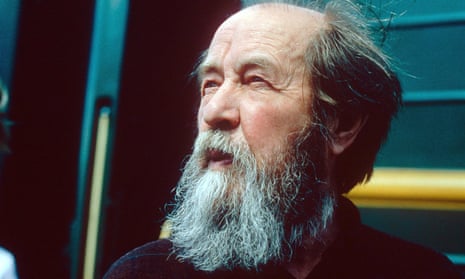With the publication of his short novel One Day in the Life of Ivan Denisovich in 1962, Russian author Aleksandr Solzhenitsyn became the first to chronicle the crushing brutality of daily life in the Soviet Union’s prison camps. Sentenced without trial to eight years forced labour and persecuted for years by the KGB, the Nobel prize-winning writer was a spiritual and moral authority for thousands of Russians until his death at the age of 89 in 2008.
But – dare I ask – do the harrowing details of his biography, and the weightiness of the tomes that he wrote, cause us to take Solzhenitsyn a little too seriously? Blinded by the big bushy beard and loose peasant’s smock that gave him the aura of an Old Testament figure, it’s easy to overlook the fact that Solzhenitsyn’s lifelong ascetic tendencies, stretching long before and after his imprisonment, are almost as endearingly eccentric as they are admirable.
To mark 11 December’s 100th anniversary of his birth, I decided to spend 24 hours in the life of Aleksandr Solzhenitsyn. I’ll never complain about Friday-night deadlines again.
1am: Wake up. When he was writing his monumental attack on the Soviet regime, The Gulag Archipelago, Solzhenitsyn would rise at 1am, work until 9am, grudgingly take a short break, then pick back up again until 6pm.
I spot the moon through my curtains, decide that battling authoritarianism can wait a few more hours, roll over and go back to sleep.
6am: Fell at the first hurdle. But it’s onwards and upwards from here.
6.10am: It is breakfast time. Each year on 9 February, Solzhenitsyn would mark the day he was first arrested in 1945. On his self-styled Convict’s Day he would allow himself only the rations he had been permitted by the camp authorities: 23 ounces of bread, a bowl of broth and a ladle of oats.
It might be December, but I’m going to recreate this feast. Lacking the traditional gourmet delights of a gulag kitchen, a dissolved Oxo cube, some slightly stale slices of toast and a sprinkling of corn flakes seem like a suitably unsatisfying substitute.
6.30am: Shuffle sheepishly back to the kitchen. Apparently, 21st-century stomachs aren’t as hardy as those bred in the Russian Caucasus 100 years ago. Two poached eggs later and I am revived and raring to get to work.
7am: I turn on my laptop and begin my research into Solzhenitsyn’s life. A man who would make Margaret Thatcher’s working hours look like Homer Simpson’s, the author was still feverishly craning over his notebooks for more than 14 hours a day well into his 80s – despite acute problems with his spine that left him unable to walk.
10am: Time for a spot of (not so) light reading, of Solzhenitsyn’s 581-page novel The First Circle. When he was 10, Solzhenitsyn read the entirety of War and Peace and decided that he would write an equivalent saga of the Russian Revolution. At the end of his life he was working on a 20-volume epic, about four times longer than Tolstoy’s, entitled The Red Wheel.
10.03am: Somewhat distracted, I check my Facebook feed. Inspecting a friend’s Majorca holiday snaps with her new boyfriend, I feel a twinge of guilt. Would Solzhenitsyn approve of my wanton interest in such frivolous matters? I think not.
When the author first began a relationship with his wife at university, it was with the caveat that their meetings should last only an hour and take place after the libraries closed at 10pm. Even during these fleeting amorous rendezvous he would ask her to quiz him on his history dates.
Later in his life, Solzhenitsyn embarked on a passionate affair with the brilliant mathematician Olga Ladyzhenskaya – but the romance ended when he decided that sex was distracting him from his writing. I diligently reopen the BBC’s Timeline of the history of the Soviet Union.
11am: After he was exiled from the USSR in 1974, Solzhenitsyn entered a self-imposed confinement in the US. He shut himself away to work undisturbed and began a hermitic existence in a log cabin deep in the mountains of Vermont. Surrounding himself with Russian prison archives and a barbed-wire fence, Solzhenitsyn had the shop owners in the nearest village place signs in their windows warning journalists: “NO directions to the Solzhenitsyns.”
I go for a quick stroll to the shops. After smiling and nodding at the postman, I quickly realise my mistake and shove on a pair of dark glasses to regain my cover. Solzhenitsyn would not smile at strangers.
2pm: Back at my desk, I try to recall fragments of what I’d been reading about the author’s biography.
Solzhenitsyn cultivated a unique writing method during his prison years: he would scribble lines for his future novels on scraps of paper, memorise the words and then swiftly burn them before they were discovered. I jot down what I can remember on a Post-it, grab a match and begin cremating my still-sticky note. By the time the last fluorescent pink slither has curled into ash, I’ve forgotten my Solzhenitsyn fun fact. Back to Wikipedia it is …
6pm: My working day finally finished, there’s just enough time to enjoy a well-earned dinner (the rest of my stock cube broth and some more stale bread) and still be in bed by 7pm in line with the Solzhenitsyn family clock.
7pm: Before tucking myself in, I place a pair of knitting needles next to the pillow (just in case of any unwelcome night-time knocks on the door). For many years Solzhenitsyn would sleep with a pitchfork next to his bed. A year after he was awarded the Nobel prize for literature, the KGB tried to assassinate the writer by arranging for a poisoned needle to be stabbed into his back. Though surely there are no Russian agents lurking around my home in sleepy Wiltshire …

Comments (…)
Sign in or create your Guardian account to join the discussion